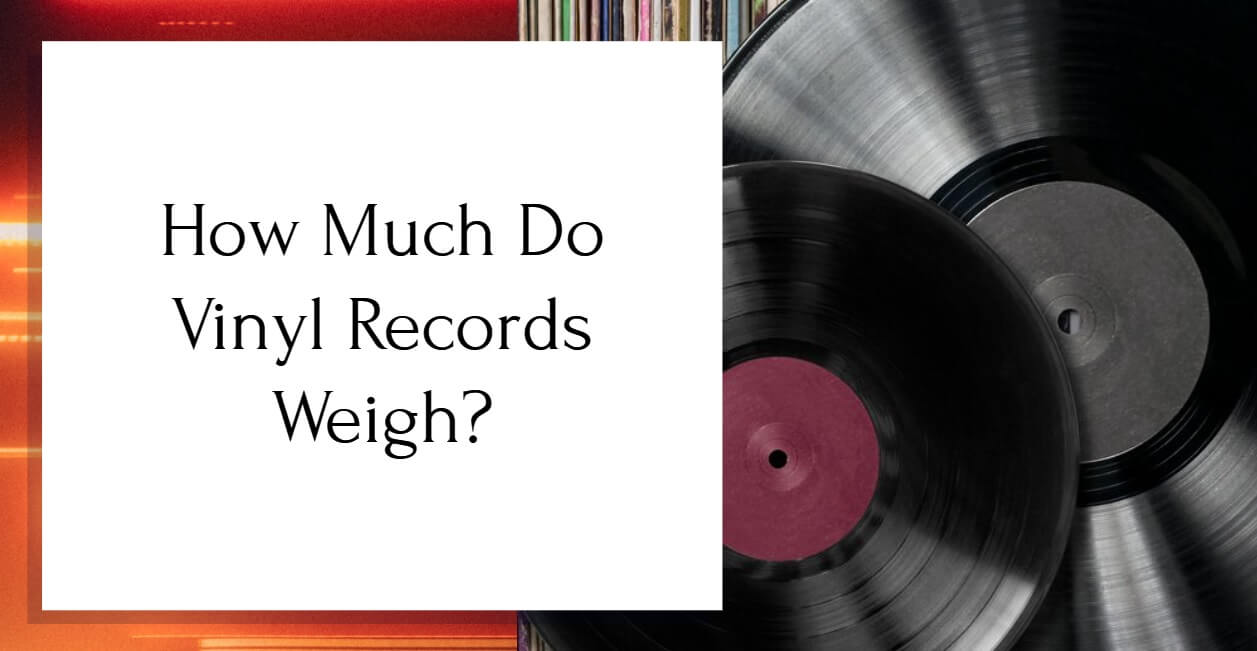Although a vinyl record’s weight isn’t the first thing you think of when buying it, it’s essential to learn about it.
To ship your record collection, you’ll need to know their weight to calculate the cost. You’ll also want to learn the weight to know what category your record falls under.
Generally, heavier records are more durable and may promise better sound quality, depending on other factors. Currently, the industry standard for vinyl records is 180 grams per 12-inch record, but there are other weights available as well.
In this article, we’ll break down vinyl records’ weight and let you in on everything you need to know.

Does the Record’s Weight Matter?
You may think that a vinyl record’s weight doesn’t matter, but it does. Contrary to common belief, it’s not responsible for the record’s high quality, but it does make a difference.
Here are some factors that weight affects.
Quality
While the sound quality of your record doesn’t depend solely on its weight, it does get affected. For the vinyl record to work smoothly without a hitch, it shouldn’t be susceptible to disruption.
Unfortunately, records that are too lightweight may get knocked off their tracks, which, of course, causes a disruption in the sound.
That’s part of why 180-gram records are now the industry standard—they’re steady on their tracks.
Generally, a heavier record is more likely to keep spinning without a hitch.
Must Read: Can I put vinyl records in milk crates?
Durability
Weight equals durability, and that’s not limited to vinyl records. Whether we’re talking about aluminum sheets, wooden panels, or whatever item you think of, a heavier weight likely means more durability and better resilience.
The same goes for vinyl records. While lightweight ones are prone to warping, heavier ones don’t undergo the same risk.
Shipping
The real essence of a vinyl record’s weight comes when you’re about to ship your precious collection. Most people want to learn about the weight for that reason—because the heavier your package is, the more you’ll pay. So, it’d be wise to know beforehand.
The same goes if you’re buying a vinyl record online and will pay for its shipping. A heavier record will come with a higher shipping price.
How Much Do Vinyl Records Weigh?
Currently, the industry standard for vinyl records is 180 grams per 12-inch record. Since that size is the most common, that’s the weight you’ll see on most records.
If we’re talking about other sizes, a 10-inch disc will weigh 110 grams, while a 7-inch disc will weigh only 40 grams or so.
If you translate that to ounces, you get 5.29 ounces for 12-inch discs, 3.88 ounces for 10-inch discs, and 1.41 ounces for 7-inch discs.
Those measurements aren’t always accurate, though. There are some exceptions, with some records reaching 200 grams and more. It depends on the thickness, so if you’re ever in doubt, it’d be better to ask the seller for the exact weight.
How Much Do 100 Vinyl Records Weigh?
If you’re shipping an extensive collection of 100+ records at once, you’ll need to know what to expect from the shipping costs.
If we’re talking about standard measurements, the industry standard for vinyl records is 180 grams. So, the weight of 100 records should be 18 kilograms, which translates to precisely 39.68 pounds.
In turn, this means you’ll pay for shipping approximately 40 pounds. The number may vary if the records come in different weights or thicknesses.
Also read: Why Is Watch the Throne Vinyl So Expensive?
How Did Records’ Weight Change Over the Years?
We’ve established that the industry standard is now 180 grams per 12-inch disc, but was it always like that?
Nope. The truth is, records were made differently back when there was no such thing as digital music. The standard range throughout the 1900s was 120–140 grams, but some exceptions were still lighter and heavier.
By the ‘70s, a lot of lightweight records were around 40–80 grams. However, those didn’t last much, and most brands discontinued these sizes by the decade’s end.
The sizes kept getting heavier until the 180-gram weight became the new standard because it’s highly durable and produces a high sound quality.
If you’re a vintage collector, you’ll notice that most vintage records will be between 100 grams and 150 grams. Only a few rare exceptions will exceed 200 grams, and some special edition records will exceed 400 grams.
Does a Record’s Weight Significantly Affect Its Sound Quality?
There seems to be a common misbelief that a record’s weight can make or break its sound quality. However, that’s far from the truth.

The weight is only one factor, and it doesn’t significantly affect the sound quality. Its effect is more related to the stability of the record on its track. This means the record is less likely to get knocked off if it’s heavy.
Likewise, a record is less likely to warp or deform if it’s heavy.
So, the weight mainly affects the durability of your records, not their sound quality. A 120-gram record may sound better than a 180-one, depending on its making and the turntable you’re using.
How to Keep a Light Vinyl Record Stable on Its Track?
Having to adjust the vinyl record every time it moves off the track can be bothersome, and it may frequently happen with 7-inch records because they’re light.
To fix that, you can always use a record clamp. It’ll prevent the record from getting knocked off by holding it in place. You’ll only have to screw it onto the player and adjust its pressure to keep the record’s sound intact.
Then, it’ll hold the record down, and you won’t feel a hitch while listening to your music.
What Is the Best Way to Ship Vinyl Records?
If you’re wondering about vinyl records’ weight to ship them somewhere, you may want to start exploring your options. If you’re shipping a large number of records, you‘ll want to buy a couple of vinyl record mailers to make sure they’re stored safely.
Try to get a mailer that comes with its own stiffeners, or else you’ll have to buy them separately. And, if you won’t use the mailer’s full capacity, try to add any kind of support inside the box so the records aren’t moving freely inside.

